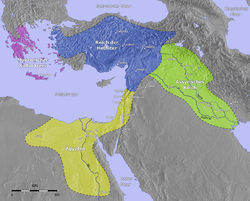Aluwamna
| Hittite Empire | ||||||||||
|
||||||||||
|
The Hittite Empire, c. 1300 BC (shown in blue)
|
||||||||||
| Capital | Hattusa | |||||||||
| Languages | Hittite, Luwian, Akkadian, many others | |||||||||
| Government |
Absolute monarchy (Old Kingdom) Constitutional monarchy (Middle and New Kingdom) |
|||||||||
| List of Hittite kings | Labarna I (first) | |||||||||
| Suppiluliuma II (last) | ||||||||||
| Historical era | Bronze Age | |||||||||
| • | Established | c. 1600 BC | ||||||||
| • | Disestablished | c. 1178 BC | ||||||||
|
||||||||||
| Today part of |
|
|||||||||
The Hittites (/ˈhɪtaɪts/) were an Ancient Anatolian people who established an empire centered on Hattusa in north-central Anatolia around 1600 BC. This empire reached its height during the mid-14th century BC under Suppiluliuma I, when it encompassed an area that included most of Anatolia as well as parts of the northern Levant and Upper Mesopotamia. Between the 15th and 13th centuries BC the Hittite Empire came into conflict with the Egyptian Empire, Middle Assyrian Empire and the empire of the Mitanni for control of the Near East. The Assyrians eventually emerged as the dominant power and annexed much of the Hittite empire, while the remainder was sacked by Phrygian newcomers to the region. After c. 1180 BC, during the Bronze Age collapse, the Hittites splintered into several independent "Neo-Hittite" city-states, some of which survived until the 8th century BC before succumbing to the Neo-Assyrian Empire.
The Hittite language was a distinct member of the Anatolian branch of the Indo-European language family, and along with the related Luwian language, is the oldest historically attested Indo-European language. They referred to their native land as Hatti. The conventional name "Hittites" is due to their initial identification with the Biblical Hittites in 19th century archaeology. Despite their use of the name Hatti for their core territory, the Hittites should be distinguished from the Hattians, an earlier people who inhabited the same region (until the beginning of the 2nd millennium BC) and spoke an unrelated language known as Hattic.
...
Wikipedia

